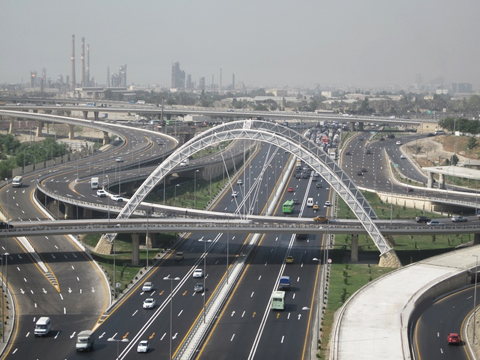Toll roads, alternative ways

By Nigar Orujova
Roads are blood vessels of any country, and reconstruction of old roads and construction of new ones is highly important. Development of road infrastructure is among the main priorities of Azerbaijan’s government, as it’s proved with the official statistics showing that the transport sector has attracted 20 percent of the total funds invested in the country's economy.
Today, Azerbaijan is renovating its main roads in Baku ahead of Baku 2015 European Games. A recent road-building in Baku have resulted in constructions of over 60 road conjunctions and 10 new underground passages, as well as nearly 60 underground and overhead pedestrian crossings.
Large investments are regularly made in the improvement of highways in the country. The volume of the constructive and repair works is increasing annually.
Expert believes, that today, the country needs no paid roads. However, in 2-5 years, the two toll roads, the Baku-Shamakhi-Kurdamir and Baku-Guba leading to the Russian border may be created. Baku-Ganja toll road is another option on the table.
The pros of the toll roads are clear as they significantly increase the speed of movement of both people and goods transported via roads.
Nariman Agayev, Chairman of the Sustainable Development Research Center, believes toll roads should not be created in the city center.
Today, Baku has some paid roads in the Old City, which are under UNESCO's enhanced protection. This practice may also be used in other historical sites of the country.
The construction of paid roads should not be carried out in the city center, but at the periphery where most traffic jams occurs, Nusret Ibragimov, CEO of consulting company MBA Group, said.
Construction of paid roads presupposes existence of alternative roads, so that a drive decides which roads is appropriate for him or her.
The toll road system is well developed in the U.S. and Europe. The post Soviet countries such as Russia, Ukraine, Belorussia and Kazakhstan enjoy the similar opportunity.
In some countries, drivers pay for the length of their way, in others, they pay based on the period of time they are on the roads.
Experts believe that construction of paid roads is sustainable and may be implemented by both private and state funds.
This year, Azerbaijani government plans to invest almost $2.24 billion in the transport sector under the state investment program.
The total length of the roads in common usage has increased from 18,754 kilometers to 19,000 kilometers in 2003-2013 in the country. About 8,332 kilometers of highways were built and reconstructed. The country also built some 222 new bridges and road conjunctions over the last ten years.
Overall, the country's Transport Ministry is expected to complete the building and reconstruction of all motor ways of international significance by 2017.
Azerbaijan, a major economic hub in the region, is set to participate in the Silk Road Corridor. The construction and repair work is currently underway on the internationally significant highway's 513 kilometers part, which runs through Azerbaijan.
The developing sector has also attracted the international financial organizations, including the Asian Development Bank and the World Bank.
--
Nigar Orujova is AzerNews’s staff journalist, follow her on Twitter: @o_nigar
Follow us on Twitter @AzerNewsAz
